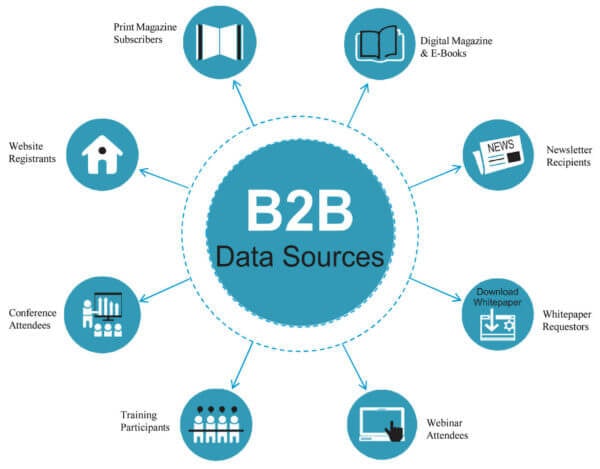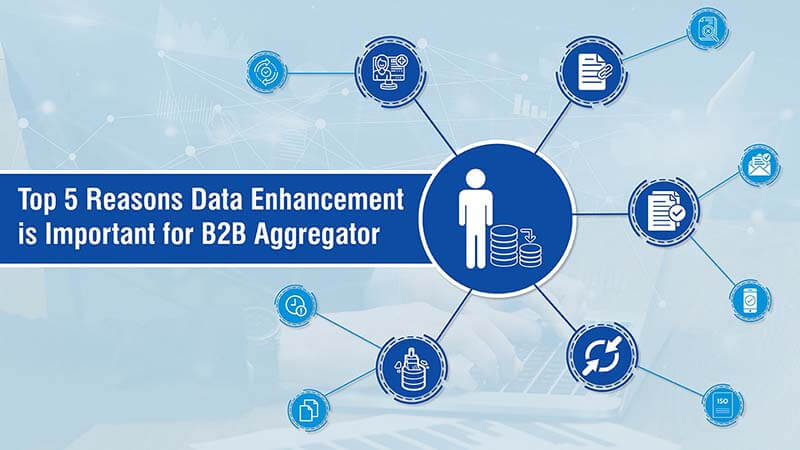You're more likely to succeed if you employ current and accurate data in your B2B sales and marketing efforts. The explanation is straightforward: if your sales force has access to current, accurate company data, they won't waste time speaking to the incorrect people. Moreover, it makes it much simpler for marketers to create communications that address their prospects' problems. Currently, there are many B2B data suppliers on the market, each claiming to be the biggest or most reliable. How do you decide which to choose?
Everything depends on the questions you ask before buying a database. But before that, let us discuss the importance of a database provider.
KEY POINTS
- What is the Purpose of a B2B Data Provider?
- The Checklist before choosing the best database providers
- Different Types of B2B Data Providers
- The Course of Action for Choosing your B2B Database
Buy 100% Opt-In Job Title specific Lists
Contact Us for Marketing Campaigns
What Is the Purpose of a B2B Data Provider?
Although data gathering and administration are essential functions in almost all modern firms, in-house data upkeep is an antiquated practice. Let's examine a few reasons why a company would choose to collaborate with a database provider.
1. New contact details: It's normal for a sales representative to search a corporate database or update CRM data to learn more about a prospect's purchasing history. However, unless you collaborate with a third-party data provider, the data in your CRM pertains to present clients and prospects rather than potential clients and clients in the future.
2. Automatic data maintenance: Contact and corporate data quickly deteriorate when phone numbers change, businesses merge, and individuals take on new roles and responsibilities. The information in your CRM will quickly go out of date if you don't have a strategy for dealing with data hygiene. Work with an established data source to maintain the data current and useful.
3. Industry standards and compliance: Partnering with a professional can assist keep your business compliant and within the law due to new rules relating to contact data and security.
4. Saves time: Using a third-party data supplier relieves your sales force of the duty of maintaining and improving data quality. Instead, they have more time to focus on selling.
Once your business grows, it becomes impractical to keep and maintain your own contact information. Investing in your data makes it valuable in the long run in terms of time, resources, and efficiency; even though a data provider is an additional expense, it is worthwhile in the end.
The Checklist Before Choosing The Best Database Providers
When choosing data providers for your sales team, there are several distinct elements to consider, just like any big choice. Here are our recommendations for the ideal B2B data source for your need.
There Are Three Types Of B2B Databases:
1. What facts can your data offer me?
When is the best moment to contact a prospect? When do they truly want to talk to you instead of ignoring you? It's the well-kept secret of cold calling! By observing businesses and their activities, you can identify hints. When firms act in a certain way, it indicates that they may be interested in you and your product.
2. How comprehensive is your data?
You must also be aware of the depths your B2B data supplier dives to gather their data. You can use more information to target new prospects as they delve deeper. Some suppliers will give you their technological stack, annual revenue, and more details. Make sure your provider can deliver it if you believe it could make a difference. B2B data suppliers will have more comprehensive data in some industries or regions. Since your sales approach may change over time, you should generally choose a vendor who is strong globally and across various industries. Ask them what kinds of data points your provider provides for each profile.
3. How reliable is your data?
The accuracy of your data should be the priority. Every incorrect piece of information can have terrible results, such as making your salespeople waste time attempting to get in touch with someone who has moved employment and is no longer employed by the organization. Your business will lose customers to rival businesses. Fresh and active data, on the other hand, enables you to streamline your pipeline, focus your audience on potential customers, and establish a context for your outreach. Ideally, you want as much of it to originate from renowned, reliable sources as you can.

Source: business2community
4. What can I do with this information?
It's great to have trustworthy B2B data in your company, but you must also be able to use it. Making a thorough ideal customer profile (ICP) and using your data provider's software to filter the full data block into a list that matches that profile is the most efficient way to produce a cold call or email list. Because you can communicate to a targeted audience likely to be receptive to a message that addresses their unique pain points, this is highly powerful.
5. Is the data privacy compliant?
Many purchasers' top concerns will be data protection and compliance. Every year, new laws and regulations are passed around the world; you should be working with a supplier who complies with these requirements. Ask your provider the following data compliance queries frequently:
- Are you listed with any regional or global authorities?
- Are you a data provider that complies fully with GDPR?
- Do you utilize CRM and storage software that complies with GDPR?
- Do your data meet all B2B consent standards?
- Do you only gather the information that is pertinent and required for your legitimate business interests?
- Do you maintain thorough and accurate records of the data you gather and process?
- Have you collaborated with any governmental organizations to guarantee compliance?
You must carefully research your provider's compliance status because the consequences of non-compliance can be severe.
6. What is the price of your data?
Pricing will greatly impact which B2B data source you pick. Your sales and marketing teams will likely suffer if you choose the cheapest solutions. However, you must analyze your return on investment- Is the data worth it to your company? The greatest data suppliers should provide an accuracy guarantee because they are confident in their data and what they offer.
7. What is it like to work with the provider?
Consider how they are to work with when deciding which B2B data source to use. Do their values match your own? Making a connection is necessary if you want to establish a long-term relationship. You should also assess your provider's success with customers. When employing data solutions for the first time, they can sometimes be complicated. Make sure your vendor excels in onboarding and has a support staff on hand to assist with any questions you may have in the future. Make sure to evaluate customer service, not just data quality, while comparing all the vendors you are considering. Going through customer testimonials is a better option.
Different Types Of B2B Data Providers
Most contemporary data providers don't fit neatly into a single category, nor are any particular suppliers superior to others. When looking for important data sources, a reputable organization knows the significance of different data categories. Before selecting your next B2B data source, consider the following:
Owned B2B Data List Providers
Owned data providers collect information through in-house data collection tools like email opt-ins, crawlers, and other proprietary sources. This information is obtained either through specialized data collection tools or through routine business operations of the vendor.
B2B Data Brokers & Resellers
The following data supplier is more of a middleman. Before reselling it to other businesses, brokers and resellers frequently gather data from many sources. This group includes the vast majority of B2B contact service providers.
B2B Data Aggregators
Data aggregators compile data from both commercial and unpaid sources. Some examples are directories, websites, publicly accessible resources, and other private sources.

Source: linkedin
Healthcare Industry Professionals Specific Lists
Contact Us for Marketing Campaigns
The Course Of Action For Choosing Your B2b Database
Any sales manager must make a significant decision when choosing a B2B data supplier because contact and account information is the foundation of almost all everyday sales strategies. Your next deal's closure is the main goal of finding a B2B data list supplier. Additionally, the likelihood of closing such deals decreases when time is lost looking through obsolete and pointless data. Data may make or break your branding efforts. Consider it the heart of your company, the force behind your attempts to produce observable, measurable results. Leveraging high-quality data is just as important for selecting the correct B2B data partner. How can you expect the highest-quality data if your data source does not meet the requirements? You can be sure to select the best B2B data vendor for your company by comparing them based on the important factors covered below. It is advisable to carefully investigate a supplier before entering into a contract. Don't be fooled by a well-known brand name; assess whether the service is worthy of the money you've worked so hard to achieve.







